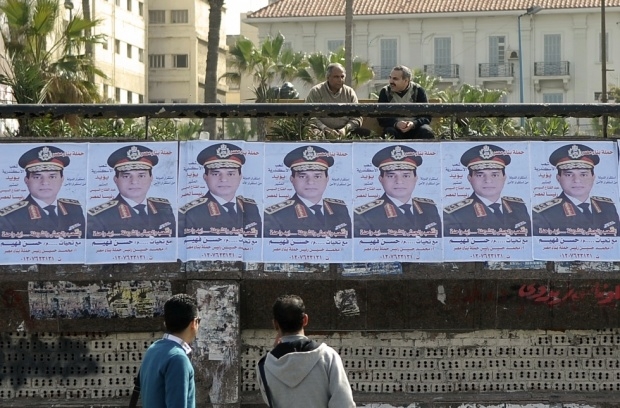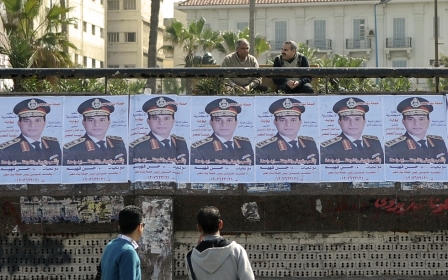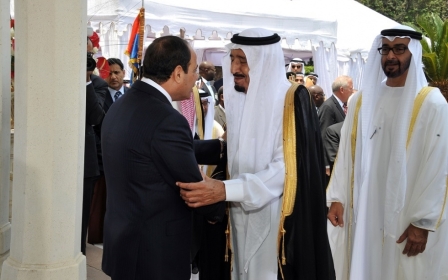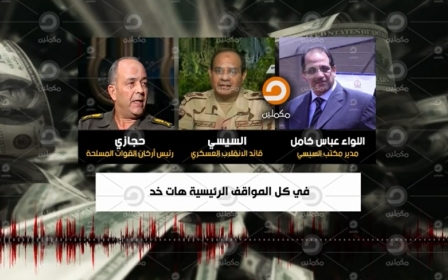Leaks from Sisi's office allege far-reaching UAE 'interference' in Egypt

Fresh leaks, claiming to feature close allies of Egyptian President Abdel Fattah el-Sisi speaking about the penetrating political role of the United Arab Emirates in managing Egypt’s internal affairs, were aired on Sunday evening.
The 70-minute leak claims to reveal conversations in which the Egyptian presidential office was coordinating with UAE officials about the delivery of weapons to Libya and the funnelling of funds to Tamarod – a movement that was established to gather popular support against ousted Egyptian president Mohamed Morsi.
The leaks also purport to reveal secret meetings between Egyptian officials, UAE leaders and Quartet special envoy to the Middle East Tony Blair.
The channel that broadcast the leaks, Mekameleen, summarised the new recordings as unveiling the UAE as “an octopus with tentacles interfering in each corner of the globe; plotting land grabs and weapons trade [transactions], staging coups and secret meetings with Israel.”
Mekameleen is a Turkey-based Egyptian satellite television channel known for its support of jailed Muslim Brotherhood leader Morsi, Egypt’s first freely-elected president, who was overthrown by the army on 3 July 2013 following mass protests.
The leaks, which cannot be independently verified, were reportedly recorded in early 2014. The voices in the recordings are allegedly of President Sisi, Brigadier General Abbas Kamel, the manager of Sisi's office, and Mahmoud Hegazi, previously head of intelligence and now head of Egypt's army.
In the leak, a voice that allegedly belongs to Kamel was recorded speaking to Sultan al-Gaber, the UAE minister of state and chairman of Masdar, an Abu-Dhabi-based company specialising in clean technology and renewable energy.
Kamel discusses the transfer of Gulf funds through the National Bank of Abu Dhabi - owned by Khalifa Abbas bin Suwaidi - which has been seen as the main channel for the funnelling of Gulf money into Egypt.
In another leak, allegedly recorded on 21 January 2014, Kamel spoke to Colonel Sedky Sobhy, Egypt’s minister of defence.
“We will need 200,000 [Egyptian pounds] from the Tamarod account […] which was opened by the Emirates,” he is alleged to have said, while shakily asking Sobhy if he could ascertain that this conversation will not be leaked.
“These leaks prove Tamarod is a creation of the UAE and the Egyptian intelligence and that 30 June was a fabrication,” Seifeddin Abdelfattah, professor of politics at Cairo University, told Mekameleen, criticising the argument made by Egyptian officials in 2013 that the military coup was a popular revolution against Morsi.
The huge protests in 2013 against Morsi were reportedly organised by the Tamarod movement and provided the basis for Sisi to argue it was a popular revolution, not a military coup, that brought him to power.
Later in the leaks, Kamel is again heard allegedly telling President Sisi that a delegation from the UAE will be coming with Tony Blair for an unofficial meeting.
Another leak featured Kamel allegedly speaking to Egyptian Minister of Agriculture Ayman Abu Hadid about taxes on Egyptian lands bought by Mansour bin Zayed, deputy prime minister of the UAE. The taxes had not been annulled on the transaction and had caused embarrassment to Sisi, according to the leak.
The Mekameleen programme went on to explain that Egyptian law was recently changed to allow foreign companies and investors to own land, which the channel alleged only took place to legalise the bin Zayed’s grab of Egyptian land without paying due taxes.
Kamel also allegedly spoke to Sisi about an Emirati plane passing through Egypt which they “do not know anything about what it is carrying” to former Libyan Prime Minister Ali Zeidan. Mekameleen said the plane was carrying weapons, although this could not be independently verified.
The leak also purported to reveal the UAE having organised a secret meeting in 2014 at which former Israeli president Shimon Peres spoke, along with Egyptian presidential advisor Mostafa Megazy, as well as many other international leaders. If the leak is to be believed, the meeting takes place on an annual basis.
Kamel and Hegazy went on to say that Egyptian Foreign Minister Nabil Fahmy is not competent enough to carry out interviews or public speeches, let alone conduct meetings abroad without the military’s prior knowledge, all of which prompts the army men to demand a detailed agenda of his meetings.
Commenting on the leaks, Ayman Nour, founder and chairman of the Ghad Party, an Egyptian opposition group, said: “The foreign minister is being directed by the military intelligence. It is obvious that Egypt is being run from the office of Abbas Kamel and the military intelligence unit.”
Egyptian authorities have stayed relatively mute on the leaks, not openly denying the veracity of the recordings, although state-allied media has claimed that they are fake.
However, a British speech analysis company has verified that at least one of the leaks is authentic.
Sunday's leaks were aired on the same day Sisi made a brief visit to Saudi Arabia and met with King Salman bin Abdulaziz al-Saud.
The leaders discussed "bilateral cooperation... and affirmed the deep strategic relations between the kingdom and Egypt, and their eagerness on strengthening them," the state-run Saudi Press Agency (SPA) reported.
They also held talks on "regional and international developments” and were thought to have discussed Sisi’s desire to form a pan-Arab force to fight regional “terrorism”.
Saudi Arabia, the UAE and Kuwait are the main financial backers of Sisi's government, having pledged around $12bn to Cairo since he came to power.
In an interview with Saudi-owned Al-Arabiya news channel ahead of the visit, Sisi insisted that Cairo's relations with Riyadh were strong, despite a recent leak that alleged the Egyptian president had insulted his Gulf patrons.
“The relationship between Egypt and Saudi Arabia, and Egypt and its brothers in the Gulf, has been strong and stable for years,” he said.
Since Salman has ascended to the Saudi throne, speculation has mounted that he is considering changing policy towards the Muslim Brotherhood, which both Riyadh and Cairo currently consider to be a terrorist organisation. The speculation has, in large part, been down to Saudi Foreign Minister Saud bin Faisal recently stating that the kingdom has "no problem" with the Brotherhood.
In a column published in anticipation of Sisi’s visit to Riyadh, Saudi academic Khalid al-Dakhil spoke of the “anxiety” in Egypt over the direction of Saudi Arabia under Salman, particularly with regard to the Brotherhood.
“Some people in Egypt would like Saudi support to take the form of gifts or open royal grants or a blank cheque,” Dakhil wrote. “They don’t, for instance, want Saudi Arabia to come close to Turkey because of the latter’s sympathy toward the Brotherhood.”
“The more rational political vision is that relations between Saudi Arabia and Egypt should not be subject to the position toward the Brotherhood or the position toward Turkey.”
Sisi and Turkish President Recip Tayyip Erdogan have had a long-running dispute over the later's closeness to the Muslim Brotherhood. Erdogan was also in Saudi Arabia in Sunday but did not meet with Sisi, who he has described as a "coup maker", in reference to the Egyptian's president journey to power.
Erdogan will meet with King Salman on Monday amid rumours the two may discuss a new strategic relationship that could isolate the increasingly embattled Sisi.
New MEE newsletter: Jerusalem Dispatch
Sign up to get the latest insights and analysis on Israel-Palestine, alongside Turkey Unpacked and other MEE newsletters
Middle East Eye delivers independent and unrivalled coverage and analysis of the Middle East, North Africa and beyond. To learn more about republishing this content and the associated fees, please fill out this form. More about MEE can be found here.




